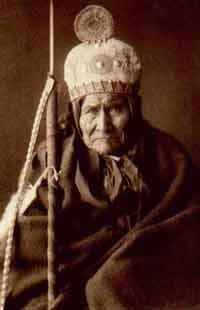 |
| Geronimo |
Not all American heroes in the nineteenth century were white, not all American heroes were of European descent. Some of the most heroic Americans were native to this country. The person who is my hero is someone who embodies my definition of a hero and encourages others to do the same. He lived in many places in the American West as well as in Mexico. He was trying to help his tribe and ultimately the many other tribes being oppressed during the 1800's. This was important because it showed America that it could not trample on the many indigenous people that lived there just because they could. My hero is Geronimo. Geronimo was an Apache Indian who fought for his people and the Native American way of life.
Geronimo’s' real name was Goyathlay (One Who Yawns) but the Mexican soldiers started to call him Geronimo after the Spanish name Jerome. It is not known how he came to be called by this name. Geronimo was part of the Chiricahua Apache Tribe. The tribe believed that Geronimo had all of the qualities of a true Apache and those values were aggressiveness and courage in the face of difficulty. The tribe was nomadic, meaning they moved with the seasons and followed the animals. Although they did raid white villages, in their culture it was an honorable thing to do when you were low on food and supplies.
Geronimo did not start out as a warrior. He was a seer and a spiritual leader. He helped the chiefs make decisions on and off the battlefields with his visions and his wisdom. Geronimo was not the chief of his tribe. His brother-in-law Juh was the chief, but he had a speech impediment so Geromino spoke for him. Many people assumed Geronimo was the chief. He was forced into being a warrior because of the bad treatment he and his people endured.
In 1858 Geronimo came home after a trading journey to Mexico and found his wife and children murdered. He then swore to avenge the deaths of his family members. Geronimo was fed up with the atrocities being committed against his people. Geronimo said at the time, "The soldiers never explained to the government when an Indian was wronged, but reported the misdeeds of the Indians." The slaughter of his family and many of the others in the camp was the last straw for Geronimo.
In 1875 all of the Apaches west of the Rio Grande were ordered to go to an arid deserted land nicknamed "Hells Forty Acres". Geronimo managed to escape to Mexico, but he was forced to go back to the reservation in 1876 with a group of other Apaches. Geronimo managed to escape the reservation three times. Each time he surrendered before he was captured in order to protect his hiding place. For the remainder of the 1870's Geronimo was peaceful and quiet, but in 1881 an Apache prophet was slain. Geronimo and Juh went to their secret camp in the Sierra Madre Mountains. They waged guerilla war with the United States army and government. They waged this war for a total of 25 years until Geronimo finally surrendered for the last time in 1886. He and 300 other Chiricahua Indians were sent to live on a reservation in Florida. There he died a prisoner of war, unable to return to his beloved land.
Geronimo was a very influential leader because he was willing to die to help his people maintain their way of life. He knew that his people were being treated poorly and he fought to make a difference. He led 300 men women and children away from one fourth of the U.S. government’s military as well as 3000 Mexican soldiers. He stood up for what he believed in. Even though he could go to prison or be killed, he made sure that the US government knew that the Apache Indians could put up a fight. He left a legacy of the last great stand of the Native Indian people, the last guerilla fight waged by the Indians and with his last stand he taught us that no matter how small you are, if you use your brain not your brawn you can make sure that everyone can hear your word.
If Geronimo were here now he would tell kids to don’t let anyone put you down because, even if you are small, you can still make a difference in this big world we call home.
Page created on 6/12/2008 12:00:00 AM
Last edited 6/12/2008 12:00:00 AM
